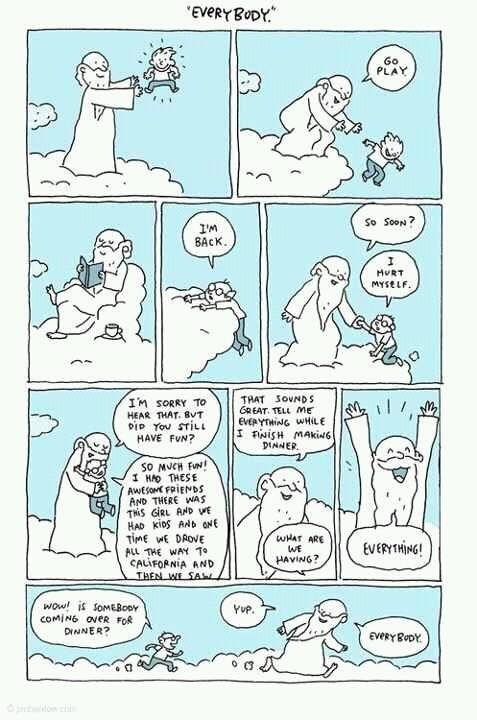This is not a political statement, but merely a well-chiseled fellow presenting a question for personal reflection…

What do you think of ‘merica?
What does “praise and worship” mean to you today?
Not long ago a very special human and I chatted about how the phrase “praise and worship” is by no means limited to K-love Christian radio or hands held high at Sunday morning services. He commented that there’s something soul-stirringly spiritual about George Strait and his tunes. For sure.
Dancing in the kitchen to classic jams is also a pure form of praise, says research professor, writer, and speaker Brene Brown:
I measure the spiritual health of our family by how much dancing is happening in our kitchen. Seriously. [My son’s] favorite dance song is ‘Kung Fu Fighting,’ and [my daughter] likes Vanilla Ice’s ‘Ice Ice Baby’! We’re music and dance lovers, not snobs…we don’t have a big kitchen so when the four of us are in there, sock-footed and sliding around, it looks more like a mosh pit than a sock hop. It’s messy, but it’s always fun.
I see that my understanding and expression of “praise and worship” has shifted and changed throughout my hours, days, months, and years. When traveling abroad, I’ve experienced a deep spiritual connection through foreign lyrics and rhythms that I couldn’t even begin to follow. When a member of a traditional church, old hymns sometimes awoke my spirit and at other times put me to sleep. In some seasons I’ve enjoyed the contemporary songs popularized on the radio; during others, I’ve reacted strongly against them. It’s kind of interesting to reflect on the developmental ages and stages of each taste.
Today, the notes and words of the song below are speaking to me. (If they resonate with you, maybe click through and watch this other one as well.)
What does “praise and worship” mean to you today?
Are you trying to be someone besides yourself?
Today, words from two slightly different sources:
 I would rather be what God chose to make me than the most glorious creature that I could think of; for to have been thought about, born in God’s thought, and then made by God, is the dearest, grandest, and most precious thing in all thinking.
I would rather be what God chose to make me than the most glorious creature that I could think of; for to have been thought about, born in God’s thought, and then made by God, is the dearest, grandest, and most precious thing in all thinking.
—George MacDonald (British philosopher with fantastic facial hair, mentor to C.S. Lewis)
Believe in your flyness, conquer your shyness.
—Kanye West (big-time rapper with unrivaled swag, lover to Kim Kardashian)
Are you trying to be someone besides yourself?
How would you describe Easter?
 I used to live in a city where I was surrounded by people practicing a variety of faith traditions, some which were basically opposite to my own. Today, that’s not the case. The small town I’ll call home for a couple more months is Bible-beltish to its core—according to ChaCha, there are approx 280 churches available to its 115,000 peeps. And though I was out of town for this past holiday weekend, it’s pretty safe to say that the town’s Easter Sunday pews were packed with people who fully identify as Christians.
I used to live in a city where I was surrounded by people practicing a variety of faith traditions, some which were basically opposite to my own. Today, that’s not the case. The small town I’ll call home for a couple more months is Bible-beltish to its core—according to ChaCha, there are approx 280 churches available to its 115,000 peeps. And though I was out of town for this past holiday weekend, it’s pretty safe to say that the town’s Easter Sunday pews were packed with people who fully identify as Christians.
 I have found value living among like-minded folks who affirm and encourage beliefs that are so central to my being, such as the hope of miraculous resurrection and redemption—promises that sustain me when some of life’s circumstances seem so dark. But I also really miss regularly encountering uncomfortable clashes of ideas, vastly different viewpoints, and discussions that force me to question whether I truly think what I say I think, and to evaluate whether my actions actually reflect my beliefs.
I have found value living among like-minded folks who affirm and encourage beliefs that are so central to my being, such as the hope of miraculous resurrection and redemption—promises that sustain me when some of life’s circumstances seem so dark. But I also really miss regularly encountering uncomfortable clashes of ideas, vastly different viewpoints, and discussions that force me to question whether I truly think what I say I think, and to evaluate whether my actions actually reflect my beliefs.
For this reason, an experience I had this Easter felt like an extra special gift. I soaked up Dallas’ sunny afternoon sitting on a restaurant patio with a great friend who happens to be Jewish. He has no idea what it feels like to cram into an overflowing Easter church service, and shopping for special pastel or polka-dotted outfits (an annual event in my early childhood household) was definitely not a part of his past. Having had a stereotypically “Christian” morning of an early church service followed a delicious family brunch, the time with my friend reminded me how small my box can be.
After our meet-up, he passed along a funny David Sedaris clip that gave me some solid laughs and served as a reminder that people across the world view the Easter holiday from countless perspectives. My perspective? I depend upon Jesus and his resurrection power, his baffling grace, and his unfailing presence. But when I step back, isn’t that quite a funny faith to profess?
Sedaris makes the point with a humorous story that hopefully doesn’t offend:
How would you describe Easter?
Do you like living?
Do you have eyes of love to see both essence and potential?
Today is the late Viktor Frankl’s would-be 108th birthday. If you haven’t read this Holocaust survivor’s personal reflections in Man’s Search For Meaning (1946), I argue that those are some words well worth your time.

Here’s one of his countless thoughtful passages:
Love is the only way to grasp another human being in the innermost core of his personality. No one can become fully aware of the very essence of another human being unless he loves him. By his love he is enabled to see the essential traits and features in the beloved person; and even more, he sees that which is potential in him, which is not yet actualized but yet ought to be actualized. Furthermore, by his love, the loving person enables the beloved person to actualize these potentialities. By making him aware of what he can be and of what he should become, he makes these potentialities come true.
Do you have eyes of love to see both essence and potential?
How do you feel about dying to self?
A few days ago I had an email exchange with a wise, inspiringly spiritual, and much more life-experienced friend about a struggle I am facing. When I asked for feedback, she shared some thoughts that I’ve since been chewing on. The gist of her response was that a life following Jesus (which is the life I aspire to live) is about continually dying — sacrificing our self-will, and “moving out of the way” that the Spirit might inhabit us each more fully and flow increasingly more freely through our beings. Paradoxically, it is in these daily little deaths, these sometimes quite painful “thy will not my will be done” moments, that truly substantive and satisfying life springs forth.
Her words about death reminded me of a song that struck me from the first time I heard it: Learning How To Die, by Jon Foreman. (Your Love is Strong and House of God Forever are his others that tug at my heart.)
I searched for the meaning of Jon’s lyrics, curious what type of death he was thinking about when writing his words. In a 2009 interview about the songs on his then-recent albums, he shared his perspective:
Mike: The songs on ‘Fall’ and ‘Winter’ in particular are quite depressing, aren’t they?
Jon: Well, it depends on what you mean by depressing. They are definitely sobering, that’s for sure. ‘Fall’ is about the act of dying and ‘Winter’ would be the act of death or hibernation, however you want to put it. I think “Learning How To Die” is a good song. It talks about all of this. I used to think that life was kind of accumulating, that you were continually learning more, growing more, understanding more. Then I had a few events in my life that made me realise that life is actually about surrender and losing, in fact maybe giving yourself away. So maybe ‘Winter’ is the most honest season. So I don’t think it’s a depressing thought but it certainly is a sobering thought to think that this life that we’ve been given actually has a purpose of surrender rather than conquest.
As one who typically feels safest so long as I feel in control, I personally find that my ego repeatedly resists opportunities to surrender, even when history has proven over and over that “letting go and letting God” is best. The way I see it, surrender requires serious humility in that it involves an awareness, admission, and acceptance that I can’t see clearly, that I’m not in charge, that I don’t know the answers, that I need help. Surrender takes a courageous willingness to let go of what I want, and to trust just enough to listen to God’s still, small voice in my heart and then obediently follow his good lead. Getting to that bottomed-out point of surrender often sucks (think Jesus sweating blood in Gethsemane), but so many testimonies prove that what follows is unquestionably worth the self-sacrifice.
And perhaps as we each develop a more intimate relationship with the one we are surrendering to—an infinite, all-loving God who somehow can give us a deep sense of peace in even the most troublesome circumstances—it becomes easier to let go. As we cultivate a spiritual connection in our daily lives, we come to know and trust that though it may still feel like jumping off a cliff, a position of surrender is actually the most secure spot to be.
How do you feel about dying to self?
Are you having fun?
How are you carrying your mistakes and failures?
 “How we carry what has gone wrong for us is essential to being at home in ourselves, and present to the world with all of its failings.”
“How we carry what has gone wrong for us is essential to being at home in ourselves, and present to the world with all of its failings.”
—Krista Tippett
Some folks tend to hang onto past junk, mentally replaying their lowest moments and whipping themselves with each repeated memory. Others have learned how to embrace and give grace, which frees them to walk lightly with their hearts open and heads held high.
How are you carrying your mistakes and failures?
Has someone else seen you and helped you believe?
“We do not believe in ourselves until someone reveals that deep inside us is someone valuable, worth listening to, worthy of our trust, sacred to our touch. Once we believe in ourselves we can risk curiosity, wonder, spontaneous delight or any experience that reveals the human spirit.” —e.e. cummings

Has someone else seen you and helped you believe?



